SABBATH THOUGHT 2023-02-18—FOOTWASHING & OFFENSES
May God bless you on His Sabbath day!
Passover is unique among all the appointed times of God. Without the fulfillment of Passover, even though it is not a holy convocation, the rest of the holydays would have no purpose or meaning. It is a time that entirely focuses on our Lord and Savior—it is not about events of God’s plan of salvation, but about reconciliation and salvation through Him. Passover, by far, has a spiritual deepness such that each year brings blessings of understanding more than before. And that is the way it should be.
One aspect of the Passover that is rarely mentioned in casual conversations is the footwashing; however, it is not only a vital beginning of the observance but it also reflects our relationship with God the Father, Jesus Christ, and each other. I highlighted “each other” because, among the Body of Christ, footwashing is primarily understood as showing humility toward the Father and Son and, of course, our brethren. However, that neglects the deep meaning behind this simple, yet essential act. Notice what Paul said about Passover:
1 CORINTHIANS 11:26-27 For as often as you eat this bread and drink this cup [of the Passover], you solemnly proclaim the death of the Lord until He comes. 27 For this reason, if anyone shall eat this bread or shall drink the cup of the Lord unworthily, he shall be guilty [G1777] of the body and the blood of the Lord.
Pause here for a moment. There have been many discussions about what it means to be unworthy to eat and drink the Passover. Generally, they are directed toward having a wrong mindset toward God. That certainly is one aspect, but Paul is leading us to something far more important. Notice what Paul said next:
1 CORINTHIANS 11:28-32 But let a man examine himself, and let him eat of the bread and drink of the cup accordingly 29 Because the one who eats and drinks unworthily is eating and drinking judgment to himself, not discerning the body of the Lord. 30 For this very reason, many are weak and sickly among you, and many have fallen asleep. 31 Now if we would examine ourselves, we would not be judged. 32 But when we are judged, we are chastened by the Lord, so that we will not be condemned with the world.
The phrase “body of the Lord” in verse 29 is not referring to the body of Jesus Christ symbolized by the unleavened bread. Two verses prior to that, Paul referred to both “the body and blood of the Lord,” which is clearly the sacrifice of Jesus Christ. Verse 29 omits blood because this refers to those in covenant with God, the ekklesia (Gk) or “the called out ones,” which is the Body of Christ. It is not referring to Christ’s sacrifice.
Paul said we are guilty of the sacrifice of Jesus Christ if we partake of it unworthily. The Greek for guilty (G1777) means held liable or subject to. A better translation would be, “if anyone shall eat this bread or shall drink the cup of the Lord unworthily, he shall be held liable for the body and the blood of the Lord.”
This same word is only used in Scripture for three specific judgments. One is in Mark 3:29 where Jesus warns against blaspheming the Holy Spirit. Such a person would be “in danger of [subject to] eternal judgment.” The same word is also used in James 2:10, which says that sinning in one point of the law makes us “guilty of all.” The previous verse clarifies that this is a matter of being convicted under the Law as transgressors. Therefore, this is better rendered, “subject to all [judgment under the Law].” However, Jesus Christ also used this word when He warned against not reconciling offenses:
MATTHEW 5:22-24 But I say to you, everyone who is angry with his brother without cause shall be subject to [G1777] judgment. Now you have heard it said, ‘Whoever shall say to his brother, “Raca,” shall be subject to the judgment of the council.’ But I say to you, whoever shall say, ‘You fool,’ shall be subject [G1777] to the fire of Gehenna. 23 For this reason, if you bring your gift to the altar, and there remember that your brother has something against you, 24 Leave your gift there before the altar, and go your way; first be reconciled with your brother, and then come and offer your gift.
NOT reconciling offenses is so serious that the judgment is the same as for someone who blasphemes the Holy Spirit! Jesus Christ said that anyone guilty of blaspheming the Holy Spirit “is subject to [G1777] eternal judgment” in Mark 3:29. Compare this to “shall be subject to [G1777] the fire of Gehenna” in Matthew 5:22 about unreconciled offenses. There is no worse punishment in the Bible. The judgment for failing to reconcile with brethren is to be cast into the Lake of Fire. Does this not spotlight the seriousness of our responsibility for reconciling?
So, what does all of this have to do with footwashing? Everything. Begin reading here:
JOHN 13:3-11 Jesus, knowing that the Father had given all things into His hands, and that He had come from God and was going to God, 4 Rose from supper and laid aside His garments; and after taking a towel, He secured it around Himself. 5 Next, He poured water into a washing basin and began to wash the disciples’ feet, and to wipe them with the towel which He had secured. 6 Then He came to Simon Peter; and he said to Him, “Lord, are You going to wash my feet?” 7 Jesus answered and said to him, “What I am doing you do not understand now, but you shall know after these things.” 8 Peter said to Him, “You shall not wash my feet, not ever.” Jesus answered him, “If I do not wash you, you have no part with Me.” 9 Simon Peter said to Him, “Lord, not my feet only, but also my hands and my head.” 10 Jesus said to him, “The one who has been washed does not need to wash anything other than the feet, but is completely clean; and you are clean, but not all.” 11 For He knew the one who was betraying Him; this was the reason He said, “Not all of you are clean.”
Footwashing certainly has a component of humility because it was a servant’s job. But that is not the foundation for understanding it. Footwashing is about spiritual cleansing. (This is not the place to go into detail about the topic, so suffice it to say that clean and holy are spiritual states[1] that are the result of being washed by Christ’s sacrifice.) Did you notice how vital it is to be clean? Jesus said if you are not clean, “you have no part with me;” that is, His sacrifice does not apply to you.
The disciples were the only ones physically washed by Jesus Christ. However, notice that Judas Iscariot was NOT clean even though Jesus Christ Himself washed his feet. Physical washing does not make someone clean—spiritual cleansing is only through the sacrifice of Jesus Christ. Being spiritually clean is crucial to partaking of the Passover in a worthy manner but there is still much more to it:
JOHN 13:12-15 Therefore, when He had washed their feet, and had taken His garments, and had sat down again, He said to them, “Do you know what I have done to you? 13 You call Me the Teacher and the Lord, and you speak rightly, because I am. 14 Therefore, if I, the Lord and the Teacher, have washed your feet, you also are duty-bound to wash one another’s feet; 15 For I have given you an example, to show that you also should do exactly as I have done to you.
Jesus said we are duty-bound to wash each other’s feet. Footwashing is an act whereby we recognize that we are washing the feet of brethren WHO HAVE BEEN WASHED AND CLEANSED BY JESUS CHRIST’S SACRIFICE[2]! The footwashing is done before partaking of the symbols of the body and blood of our Lord because the sacrifice of Jesus Christ applies to both our own self as well as our brethren. Recognizing that His sacrifice applies to others besides ourselves is part of the Passover ceremony. This is why the Passover cannot be properly observed if unreconciled offenses exist and why it can become a matter of judgment. Without reconciliation, we do not acknowledge others as brethren; instead they are enemies. Are we able to wash the feet of someone who is an enemy and then partake of the symbols of the body and blood of Christ in a worthy manner? We EXAMINE ourselves to ensure we are sincerely reconciling all offenses before we partake of the symbols of a sacrifice that atoned for OUR offenses against God. This is key to keeping the Passover in a worthy manor. Remember, Paul said we are unworthy if we are “not discerning the body of the Lord,” which is all God’s children.
If there is an unreconciled offense with a brother or sister in Christ, we are not showing agape love to those who have likewise been washed in the sacrifice of Jesus Christ. Humility is required to acknowledge that the sacrifice of Jesus Christ applies to us and others. Offenses are a stumblingblock to discerning the Body of Christ—our brethren.
The footwashing demonstrates that we understand that not only are we washed by the sacrifice of Jesus Christ but so are all those in the ekklesia because Jesus Christ died for everyone[3]. That is why the footwashing comes first, before we partake of the symbols of the Passover. Those symbols are a remembrance[4] of the sacrifice of Jesus by which we have a covenant of reconciliation for our offenses with God. Observing the Passover in a worthy manner is in keeping with the expectation that we edify one another in agape love:
EPHESIANS 4:13, 15-16 Until we all come into the unity of the faith and of the knowledge of the Son of God, unto a perfect man, unto the measure of the stature of the fullness of Christ; … 15 But holding the truth in love, may in all things grow up into Him Who is the Head, even Christ 16 From [Jesus Christ] Whom all the body, fitly framed and compacted together by that which every joint supplies, according to its inner working in the measure of each individual part, is making the increase of the body unto the edifying of itself in love.
Self-examination is vital to recognizing and acknowledging our part in offenses. It is crucial to know if there are outstanding offenses and to put forth a sincere effort to begin reconciling them before partaking of the body and blood of our Lord and Savior.
NOTE: For those who keep the Passover alone, footwashing cannot be physically performed. However, personal examination before the Passover is still required. In place of the footwashing, I suggest offering a heartfelt prayer of thanksgiving for being washed in the sacrifice of Jesus Christ and humbly ask blessings upon all who have been cleansed by the Lamb of our Passover sacrifice.
May God’s grace and peace be upon you!
Steven Greene
https://sabbathreflections.org
[1] For more information, go to https://sabbathreflections.org/bible-studies/audio where you will find Spiritual Warefare—Cleansing, parts 1 & 2.
[2] Note: This is why only those who are baptized in the name of Jesus Christ can be a part of the footwashing as well as partaking of the Passover unleavened bread and wine.
[3] 1 Cor. 5:14-15.
[4] 1 Cor. 11:24-25.



5 comments
Anne Elliott
We have all been mistaken when we thought that servants washed other’s feet! Nowhere in the Biblefrom Genesis is it ever shown that servants washed feet, except for Mary Magdalene who washed Jesus’ feet with her own tears of remorse, and Jesus himself when He washed the disciples’
The reason people washed feet before entering a home was because the roads were filthy with powdered donkey and camel dung which coveredtheir open sandals and feet when they walked the dusty, unpaved roads. ( I have been to Jerusalem and done that. It is very disgusting. ). This was such a n unclean thing to do that even the lowest servants were not required to fo it. See Genesis 18:4 Where Abraham offered the Lord and the angels water to wash their own feet! No servant was offered to do it.
To me Christ’s action was an example to all of us that we must be willing to humble ourselves in every way, even to the lowest service of the church of God, justas Jesus did, by dying for our sins- He lowered himself to the lowest of the low.
Debbie & Mike Wilsdorf
Good refreshing for the seriousness of foot washing and examining ourselves to forgive and not to judge another. We are not judges but are in training TO BE judges in God’s Kingdom.
Thanks
Kri
Thank you so much for such a clear and concise explanation of the foot-washing ceremony before you partake of the bread and the wine. It was very thought-provoking, and I am examining myself to see who I might need to reconcile with. Sometimes we have upset someone without ever realizing it, and we need to be thoughtful of one another’s feelings and points of view (As long as we attempt to align them with God). We are all at different places in our understanding and, therefore, must be patient and loving and not feel superior to those whose understanding lags behind ours. Chances are, they understand something you do not.
Donna
WOW!! This is the *BEST* explanation of the Footwashing that I have EVER read!!! VERY PROFOUND!! THANKS Steven!! 👍👍
Peter
Thought provoking and interesting, godly commentary. Many people missunderstand the importance of baptism prior to footwashing. It links to both the identity of God’s called out chosen ones and the need to recognise the church. Accurately presented here but worthy of more detail.